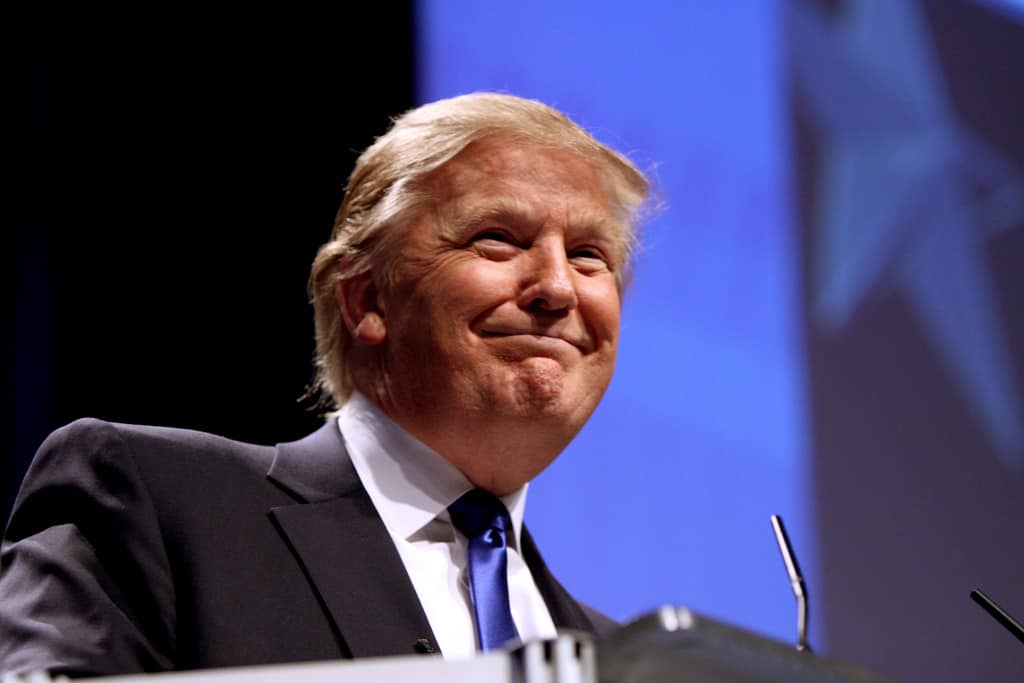Do I love Trump?
As we celebrate Presidents’ Day, I have spent a great deal of time thinking about our new President, and this is a question I am honestly struggling with. Do I love him? What does it mean for me to love him?
Surely I am called to love him, just as I am called to love my brother and my sister, the homeless beggar by my school, the driver that cut me off, the undocumented immigrant, the unborn child, a convicted felon, an investment banker, my out-of-the-closet friend, and the Jesuit in my community that gives homilies that run too long.1
Admittedly, some of the people on that list are harder for me to love than others. And sure, I find myself wondering what it even means to “love” them. But I don’t question the fact that I’m called to love them all.
Do I love Trump?
Very few people, it seems to me, are just lukewarm about our President. Partisanship and polarization in our country have reached new heights. People have taken to the streets en masse to advocate for women’s rights and protest Trump’s executive orders. Meanwhile, participants in the March for Life expressed a sense of hopefulness with the start of the new administration and the nomination of Judge Neil Gorsuch to the Supreme Court. Fury in many, hopefulness in others. And a monstrous gap between them.
It is this polarization that provokes such strong reactions to a comment like…
“I love Trump.”
*****
What does it mean: to “love” Trump? Despite the abundance of words in the English language, we apply the word “love” in such different contexts that its meaning can be tough to decipher.2 In this article, I am focusing on the Christian sense of “love” from the Gospel call of Jesus.3
The prolific Christian author C.S. Lewis wrote that in the Christian sense, “love is not an affectionate feeling, but a steady wish for the loved person’s ultimate good as far as it can be obtained.” By Lewis’s understanding, “to love someone” according to the Gospel call is not the same as “to like someone” in affectionate terms. Nor is it the same as to agree with them, or follow them, or support them, or vote for them. It leaves room for disagreement and even dislike.
To love Trump, then, does not mean “he’s my ideal president” nor “I agree with all of his policies.” Instead, it could be re-phrased as, “to wish the best for him.” That seems to be an easier question for me to answer. I do wish the best for him and for his Presidency. I wish the best for our country in his care. I wish the best for the world during the duration of his time in office. In that sense, I feel comfortable saying it: yes, I love Trump.
*****
What does loving Trump look like?
Loving Trump means celebrating his victories and any progress that comes during his presidency: whether that involves protecting the lives of the unborn, investment in infrastructure, job creation or a rising stock market. Loving Trump means not sinisterly wishing that everything goes wrong during his time in office to prove he was unfit or a poor choice.
Loving Trump means looking for common ground as a starting point. If we want to break down the barriers of divisive partisanship and polarization, we have to be able to work together in relationships rooted in love even when we disagree on important topics. Today we can recall the efforts of the great American President Abraham Lincoln to bring together a diverse cabinet of advisors from different political parties. It wasn’t always pretty, but it helped create compromise. What a far cry from the echo-chambers we now tend to occupy and the one-side cabinets our political leaders construct.
Loving Trump means praying for him. For this, I find inspiration in the early Jesuits. St. Ignatius, the founder of the order, wrote letters of instruction to early Jesuits about befriending nobles in order to advocate for justice, and he encouraged fervent prayers for royalty and political leaders, including and especially those that opposed the Church. With the great influence leaders have in the lives of so many, they need our prayers that God’s love might manifest itself in their leadership.
*****
What does “loving Trump” not mean?
Loving Trump does not mean I have to be indifferent or approving in regard to all his actions as President. I wish the best for him, but I also have my uncertainties and fears. From executive orders banning many immigrants and refugees to the threat to repeal expanded health care, many of Trump’s policies have set off alarm bells for me, as well as many leaders in the Catholic Church.
Loving Trump doesn’t mean I have to abandon my principles or passively accept his policy choices. Rather, loving him should be guided by my faith-rooted principles. Loving him should include raising my voice in objection to actions he might take against the common good, against the poor and marginalized, and against the care for our common home.
When we talk about leaders (political, corporate, or otherwise), we have to recognize the ways their actions have implications beyond themselves. A president’s decisions affect millions of other lives. Our call to love an individual does not supersede our call to love all people, with particular concern for the most marginalized (also a Gospel call).
How then do we advocate for the marginalized? Resistance and protest are essential on issues of justice, but it’s important to remember that they are most effective when grounded in nonviolence and love. A combination of violence (in language or action) and hatred undermines the core values which form the basis of such resistance.
In Pope Francis’s message on the World Day of Peace last month, he wrote about this very theme. “Active nonviolence is a way of showing that unity is truly more powerful and more fruitful than conflict…Certainly differences can cause frictions. But let us face them constructively and nonviolently, so that ‘tensions and oppositions can achieve a diversified and life-giving unity,’ preserving ‘what is valid and useful on both sides.’” Active resistance should involve unity, not polarization; nonviolence, not conflict; love, not hate.
“Love Trumps Hate” has been a popular slogan for anti-Trump protesters. We all need to take that message seriously and confront the hatred that we carry, regardless of our political ideology. Protesters risk falling into the very trap they are protesting against and harboring hatred: for Trump and his supporters. The truth is that people on all parts of the political spectrum have been guilty of inciting hate and exclusivity. We are all sinners; we all need to grow in love. Because ultimately love – a love oriented towards justice and truth – really does trump hate.
*****
We are called to love one another. We cannot too easily dismiss this call. It is challenging and outright exhausting at times. But it can also be world-changing. It is radical: we are called to go so far as to love our enemies. Like or dislike Trump, friend or foe, we are called to love him. To wish the best for him. To oppose any injustices, yes. But also to celebrate when he brings justice. To pray for him. Yes, to love him.
It might not be easy, but then, who said it would be?
I have made up my mind: I will love Trump. Will you?
***
Image courtesy FlickrCC user Gage Skidmore.
- Jesus is pretty clear on this: “I give you a new commandment: love one another. As I have loved you, so you also should love one another.” (Jn 13:34) ↩
- I explored this topic with “hate” in a previous article: https://thejesuitpost.org/2014/06/sports-hate/ ↩
- For example: “You shall love your neighbor as yourself.” (Mt 22: 39), and “Love your enemies and pray for those who persecute you.” (Mt 5:44) ↩


